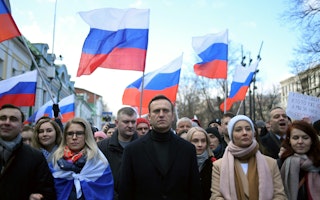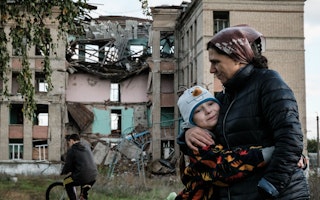Could This Media Outlet Change the Way Russians View the News?
By Gregory Shvedov
When some people think of Russia, they think of a wall—a wall created by government restrictions, by censorship, propaganda, and political assassinations. A wall emblazoned with Putin’s image. But this isn’t the full picture. The wall in Russia is in the minds of the people. It’s a wall of consciousness that prevents people in Russia from taking action. A legacy of our Soviet past, this lack of activism is the wall that truly holds Russian democracy at bay.
As the editor of the Russian internet media outlet Caucasian Knot [full site in Russian], I consider it part of my job to fight the social apathy that pervades this country. We set up Caucasian Knot 15 years ago to give visibility to the human rights violations in the Caucasus in an accessible and impartial way.
Life in the Soviet Union made a lot of Russians used to propaganda. They like easy answers to complicated questions and want to avoid taking a stand. There’s a lack of interest in alternative sources of information and what’s really going on. It’s a circumstance that raises the question: is the problem the state that tortures people, or the society that doesn’t react? The sociologists today call these people “those who don’t care.”
For instance, there are people who criticize Russia’s corruption, and then bribe the police to avoid a speeding ticket. This is like complaining about your dirty yard and then throwing your cigarette out the window. These are the people we need to get the attention of, and help understand the link between the reality of Russia and their own actions. Not the people who are already on Amnesty International’s email list. How do we get the ones who say they support Putin, but who have doubts and concerns? That’s our target.
To do this, first we need to understand where their apathy comes from. A lot of people are frightened. There are a number of people who dared to express themselves and got in trouble for it. So an important part of our work is to break through this ice of social apathy, and one way we do that is by going beyond traditional media reporting and showing people they can use Caucasian Knot as a tool to fight injustice.
We have a 24-hour text-messaging service, and we say to our readers, “Tell us what’s going on. If your neighbor is raped or attacked or kidnapped, and you see that there is a police car involved, send us a text message.” Is it safe? No, it’s not completely safe; telecommunications companies can expose your personal details. But people have been doing it anyway.
Although we’ve created a secure platform to keep these text messages confidential, we are not able to secure the communication channel itself. Online comments are another concern: from time to time we receive requests from the intelligence agency to provide information about who wrote certain comments. We reject these “friendly” requests.
It’s this climate of fear that makes Russia ill with self-censorship. While many Russian media organizations have a list of people who cannot be quoted, at Caucasian Knot we have no such list. Impartiality is important. We have an ethics code, and each of our journalists have signed on to it. We have a legal team that helps us navigate through ever-changing media laws while staying true to our journalistic principles. We also use social marketing tools—including surveys—to find out how we can better reach people, how to motivate them to respond, and what are the things they really care about.
If journalists would unshackle themselves, and if more people would read and comment on the human interest stories, a lot of lives would be changed. Because those who torture, those who violate human rights, they’re afraid of buzz. They may not understand the importance of human rights, but they understand buzz.
For example, a Caucasian Knot video [in Russian] of an unknown man from the Caucasus being tortured started a buzz and ended up being shown on Russian TV. As a result, it was watched more than 600,000 times. When these people who torture and kill see such publicity, when they see there is a light shining on the crimes that they are committing, they don’t like it, and it influences what they do.
The average Russian citizen is influenced as well. People need to trust the information. People need to trust people. If you can win the trust of readers, then things might change. Change won’t come before trust. When someone you trust talks about human rights and corruption in a fair and accurate way, only then might you say to yourself, “Maybe I should stop bribing the police officer on my street corner who I’ve been bribing for the past 10 years. Maybe my actions make a difference. Maybe I can break the wall of consciousness and change, too.”
Caucasian Knot is a former grantee of the Open Society Foundations.
Gregory Shvedov is editor in chief of Caucasian Knot.


